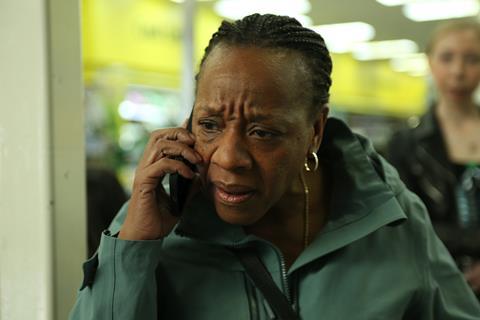Mike Leigh bites back with this trenchant piece starring a superb Marianne-Jean Baptiste

Dir. Mike Leigh. UK/Spain 2024. 97 mins.
If there is something oddly familiar about Mike Leigh’s Hard Truths, it is not that the revered British film-maker is repeating himself. Rather, it is because his new film is so densely patterned with echoes of his earlier work that it brings an extra layer of fascination to this emotionally trenchant piece. Following his hugely ambitious period productions Mr Turner and Peterloo, the director returns to what might be considered the quintessential Leigh mode of tightly-framed domestic drama, and does so with exceptional bite.
As resonant and as satisfying as anything in the Leigh canon.
Premiered in Toronto and now competing in San Sebastián before heading for a London gala slot, Hard Truths features superb performances from Marianne Jean-Baptiste and Michele Austin, heading a predominantly Black ensemble cast - a shift of focus which may well broaden Leigh’s audience on both sides of the Atlantic.
The action begins in a leafy suburban street in London, and one house, whose closed-in porch and shuttered windows suggest inhabitants hiding from the world. This is the home of Pansy (Jean-Baptiste), a woman in late middle age who starts her day by waking in panic, and spends the rest of it venting her rage. Doctors, dentists, supermarket cashiers –everyone incurs the explosive wrath of a bitterly unhappy woman devoured by misanthropy, neurosis, resentment and fear. Her feelings seem to have drained the life out of her ineffectual plumber husband Curtley (David Webber) and their unemployed, introverted 22-year-old son Moses (Tuwaine Barrett), who disappears on long walks when not taking refuge in his headphones.
By contrast, Pansy’s hairdresser sister Chantelle (long-time Leigh regular Austin) is an empathetic soul who can handle her own sorrows but also embrace joy, and whose adult daughters Kayla (Ani Nelson) and Aleisha (Sophia Brown) pursue their careers (in cosmetics and law respectively) while living life to the full. Chantelle’s salon plays a similar function here to the photographer’s studio in Secrets And Lies and the tailor’s in Vera Drake, showcasing a gallery of succinct but rich character cameos. Indeed, Hard Truths is characteristically rich in supporting roles, from Jonathan Livingstone’s deadpan turn as Curtley’s talkative co-worker Virgil, to Samantha Spiro as Kayla’s glibly abusive boss.
Jean-Baptiste won massive acclaim in Leigh’s 1996 Palme d’Or winner Secrets And Lies, but she outdoes herself here in a role that is arguably more challenging because Pansy is so rebarbative. She fulminates, flings insults, retreats into a hole of self-pity – yet Jean-Baptiste at once makes her grimly comic and keeps us intrigued to discover the softer core of this profoundly damaged woman - especially in her silent moments, when the simple quiver of her lip speaks volumes.
Hardly a radiant flower, Pansy might be considered a mirror image of hyper-optimist Poppy in Leigh’s Happy-Go-Lucky. And this film’s title suggests a pendant to Secrets And Lies: both feature a family get-together in which repressed emotions well to the surface. These and other echoes and reversals are not just fodder for Leigh’s followers, but bring added depth and complexity to an already densely-conceived film.
No doubt there will be some debate over Leigh’s qualifications to portray this particular milieu, a middle-class and upper working-class sector of London’s Afro-Caribbean community. But bearing in mind his famous collaborative working methods, it is clear just how much the cast have contribute to the film’s cultural detail. While the dramatic premise is hardly specific to a Black environment, the references and linguistic patterns feel bang-on – notably Pansy’s shifting between Cockney and Caribbean inflections. It is of course arguable that being Black in the UK is an integral part of Pansy’s, and other characters’, struggle in life – although racism per se only figures implicitly, most apparent in the scene where Spiro’s pink-suited exec attempts to humiliate Kayla.
Dick Pope’s photography, while seemingly unflashy to the point of being self-effacing, is more finely calibrated than ever – as witness the starkly eloquent framing of a shot showing a bunch of flowers in a grey, featureless kitchen. Similarly, every detail of Suzie Davies’s production design, and of Jacqueline Durran’s costumes, adds its own meaning to the drama that in its spare way, is as resonant and as satisfying as anything in the Leigh canon.
Production companies: Thin Man Films, Mediapro Studio
International sales: Cornerstone Film, office@cornerstonefilm.com
Producer: Georgia Lowe
Screenplay: Mike Leigh
Cinematography: Dick Pope
Editing: Tania Reddin
Production design: Suzie Davies
Music: Gary Yershon
Main cast: Marianne Jean-Baptiste, Michele Austin, David Webber, Tuwaine Barrett























No comments yet